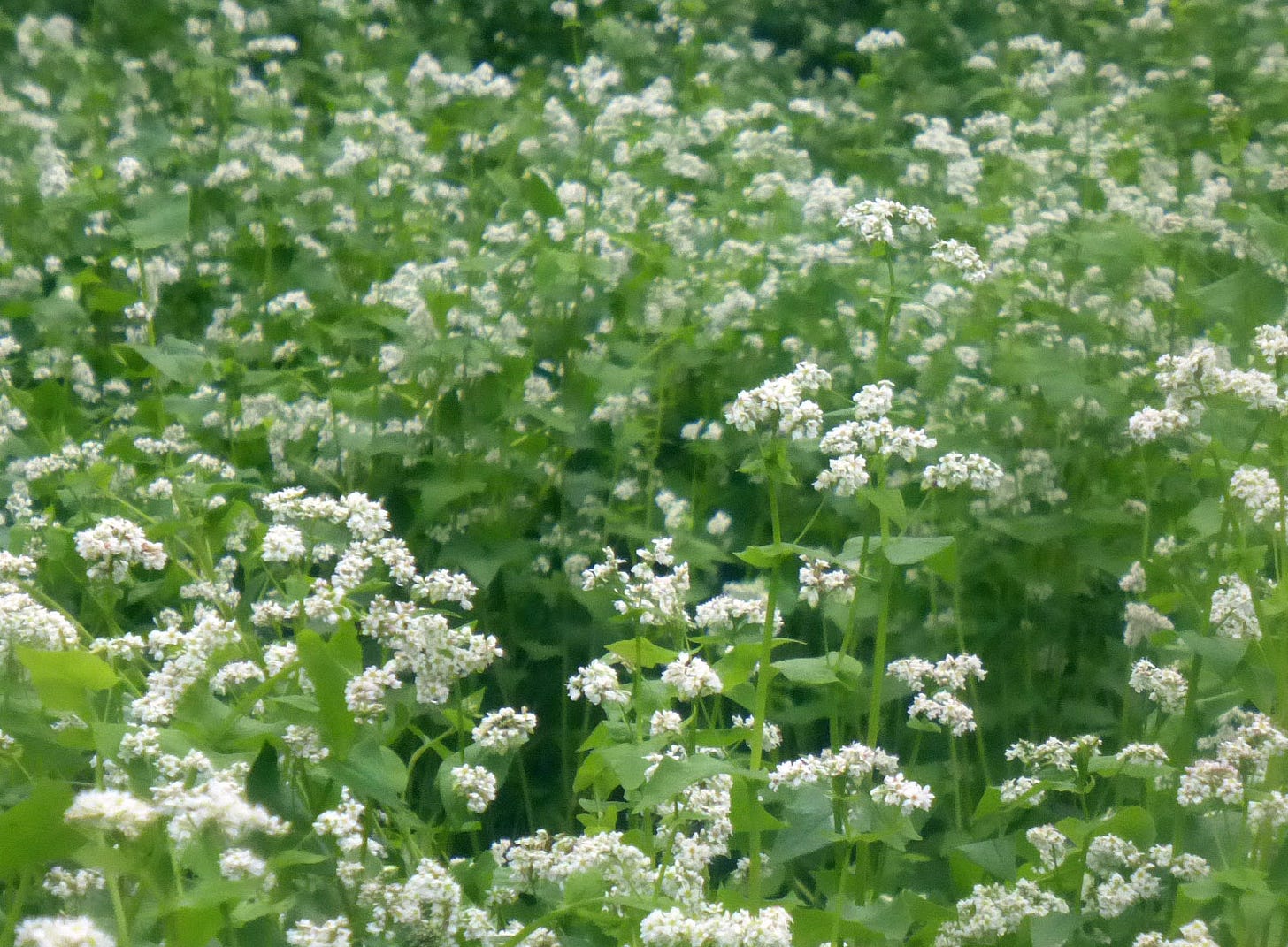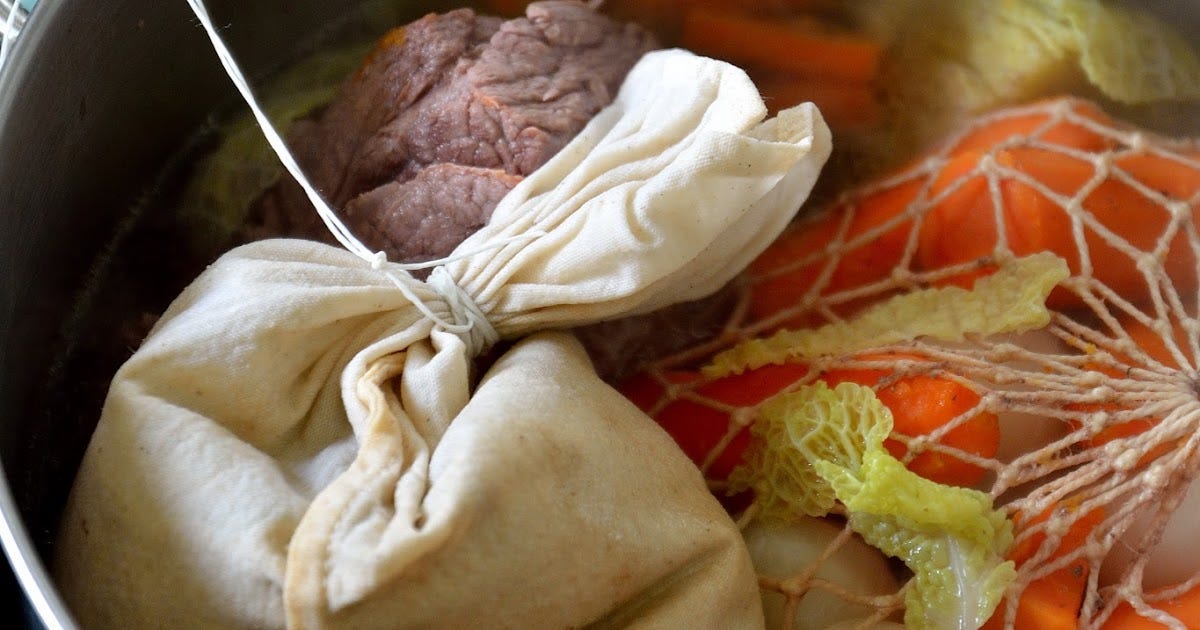The future is nuts
putting our bucks into buckwheat.
part 1: farming, food and buckwheat
part 2: cities.
part 1
I reckon that Murphy’s law should only be used to describe what happens to food producers. We prepare, we manage and then a curved ball will come swinging in. They say that “man plans and the gods laugh” well farmers have to plan all the time and then we find the rake hidden in the long grass, in this case, climate change.
The spring here was particularly wet, unusually so. I prepared and sowed into my growing beds as I have done for the last 8 years. I then had to go away and left the market gardens in the hands of someone else. When I returned it was to find an infestation of slugs such as I have rarely seen and NEVER seen here. Of course all except the peas, roquette, radishes, potatoes had been eaten. Silly me. 2024 is the exception that tested the rule ‘there are rarely if ever slugs here’ and found it to be false.
The farming world is pretty conservative and in some ways rightly so. This conservatism however is now confronted by rapid change. This change is pushing some farmers to adapt and others to call for more governmental financial aid as they either refuse to or cannot adapt.
Wheat, rice and rapeseed yields, for example, have already been negatively impacted by climatic forcing. The impact on citrus production in Sicily and southern Italy is pushing more and more growers to switch to tropical fruits like papaya, mangoes, bananas and more. They have adapted and we will all have to follow suit.
As consumers we will have to change our habits. This is another conservative area, people tend to stick to what they know they like or have the habit of. Bread, pasta, noodles etc need wheat, wheat culture is becoming increasingly problematic. These foods are staples for a very large number of people, it will probably be difficult to get people to change and the further question is change for what? Substitute wheat with what other type of crop?
Sholto-Douglas and Robert Hart saw tree crops as being the way forward. It’s true that in many ways nut crops are easier, more climate resistant, perenial and better foods than grains. The nut trees and shrubs draw down Co2 and even more importantly their cultivation requires much fewer machines and far less diesel. All good stuff for the planet.
Selling people a diet based on nuts and fruits maybe be difficult but probably not impossible. Especially if we add in things that can be more easily adopted because people are already familiar with them. To do this we could use strategies that avoid any ‘stop eating bread’ type of polelmic and instead use a ‘have you tried this, it’s incredible!’ strapline.
So here I am making the case for buckwheat. A plant which can continue producing in climatic conditions that will kill wheat or massively reduce it’s yield. Buckwheat flowers are great for insects and the seeds themselves are rich in minerals. It is also a crop that grows well in poor soils. Lots of advantages.
Saying all the above won’t convince people to replace wheat with buckwheat so it’s better to appeal direct to their bellies.
Those people fortunate enough to have visited Brittany (Breizh) will no doubt have tried the local galettes (Kaletez). These are ‘pancakes’ made from buckwheat flower. They are often followed by a sweet crêpe or two which are made using wheat flour, this isn’t traditional and galettes were eaten savoury or sweet.
When we make cider and apple juice a bit of the juice goes direct to the kitchen. There it’s mixed with buckwheat flour to make sweetened pancakes that go down well with some of the previous season’s cider.
Using Buckwheat flour isn’t the only tradition in Brittany, there is of course the Kig-ah-farz. Ok, now this could be difficult sell to vegetarian and vegans because … well basically Kig means meat. The traditonal dish is slow cooked meats and vegetables. The ‘farz’(or more correctly farz sac’h for buckwheat as opposed to farz gwen which uses wheat flour) is a muslin bag of buckwheat flour cooked with the meat and veg. We can of course add more veg and not use meat to make a ‘Legumaj-ah-farz’.
Spaghetti could possible be made from buckwheat after all Japanese Soba noodles and Korean Mak-guksu are. There is already an example of tagliatelle made from buckwheat in the Lombardy region of Italy called Pizzoccheri. In the Savoie region of France people have been enjoying Crozets de Savoie which are small square flat buckwheat pasta. North Amercian waffles traditionally use buckwheat flour and we need to mention the Oyaki from Japan which are stuffed buckwheat dumplings. There are quite a few other traditional dishes but I’ll finish with Kuttu ke pakore from India which are deep-fried battered vegetable fritters.
All of these wonderful dishes can be washed down either with a roasted buckwheat tea or a buckwheat whisky!
How about that for some attractive selling points? If we cultivate the buckwheat in an agro-forestry context we can have all these delicious dishes, top fruits and nuts and draw down Co2! From a nutritional perspective buckwheat is rich in niacin, magnesium, manganese, phosphorus, dietary fibre and protein.
We can insist on maintaining our ‘normal’ diets and thus put more pressure onto farmers to continue growing these crops. Or we can start creating a bigger market for easier to grow, climate friendly ones. In one way or another change is inevitable, I hope this article has shown how we can surf these changes and improve our diets.
part 2
We have this fixation with certain foods and with cities. There seems to be some sort of accepted inevitability about how the media and most people think about cities. In their minds cities have always existed and alsways will, they are seen as being the ‘natural’ habitat for our species. This frankly strange point of view is even stronger for capital cities. Those people born and brought up in Paris refer to the rest of France as the ‘provinces’ which is somewhat of an insult.
Cities are seen to be the main drivers of economic growth but this growth is shredding the planet and can’t continue.
Cities are seen as cultural centres of great importance. Giving greater status and value to a bit of paint splashed on a canvas than to an ancient tree means you can get on a shred the planet. At least we’ll still have Monet. This absurd mis-valuing of stuff will have to change.
Cities provide high status jobs, the clean hand ones, the ones where people move stuff around but don’t create anything. You are what you eat and without food you’re dead. Coming back to part 1, farmers have a de facto higher social importance than anyone else and yet a low social status. This is something else which MUST change.
We are spending vast somes to try and make our cities ‘climate change resilient’. All these policies address the symptoms and not the cause. Any real urban politic would prioritise breathing life back onto the abandoned rural areas and relieving the incessant urban population pressure. The flood of rural to urban migration has to stop, the trickle of people moving from cities to rural areas has to increase.
Perhaps a way to do this would be that having a garden become a universal human right. Whether people live in a house or an appartment block they will, de jure, have a garden area. This coupled with inversing the importance status we give to cities and give it back to the land that feeds and nourishes us should help. Keep on fiddling with cities rather than get on with the real work isn’t going to do much.
In light of the fact that climate change is also changing the Earth’s albedo due to the loss of sea ice, maybe we should paint all our cities white?





Love buckwheat flour I buy it in locally. I grow lots of it but haven't made flour from it just as a cover crop it has such a pretty flower the bees love it.
Fully endorse first piece, 2024 the exception that proves the rule...slugs yes but also voles/mice who dug up and ate three sowings of broad beans so I got none- 1st time in over thrity years. Also millipedes in new and main crop spuds- tiny entrance hole and the inside bored out into caverns full of them and their many babies, lost about half the crop- who would have thought it? No doubt more waves of unexpected change will keep rolling in. Helps being a taoist gardener- it is what it is. Will try buckwheat next year.